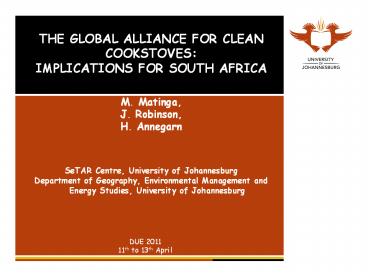THE%20GLOBAL%20ALLIANCE%20FOR%20CLEAN%20COOKSTOVES:%20IMPLICATIONS%20FOR%20SOUTH%20AFRICA
Title: THE%20GLOBAL%20ALLIANCE%20FOR%20CLEAN%20COOKSTOVES:%20IMPLICATIONS%20FOR%20SOUTH%20AFRICA
1
THE GLOBAL ALLIANCE FOR CLEAN COOKSTOVES
IMPLICATIONS FOR SOUTH AFRICA
- M. Matinga,
- J. Robinson,
- H. Annegarn
- SeTAR Centre, University of Johannesburg
- Department of Geography, Environmental Management
and Energy Studies, University of Johannesburg
DUE 2011 11th to 13th April
2
Why with near universal electrification?
- Dependence on biomass and coal persists in South
Africa, as does unsafe paraffin use - Deaths from paraffin known (e.g. PASASA)
- Deaths and health burden from IAP not well
known in South Africa - IAP extra burden on those with TB
3
Whats happened so far?
- Inconsistent and low profile efforts never
national scale efforts - Even PASASA is not well resourced to afford
provincial and municipal activities - Some interest at local government but often not
resourced - Most affected Women and children but also poor
men - Clean energy initiative therefore a social equity
issue
4
What is the Alliance?
- Formally announced in September 2010
- Patron Hilary Clinton
- Coordinated by United Nations Foundation
- Aim to reduce deaths from IAP by ensuring 100
million stoves by 2020 - Members Country govts, bilateral and
multilateral aid agencies
5
Contribution to households
- Poverty alleviation, through production and sales
- Through efficient use of available resources
- Providing affordable fuels and
- Reducing expenditure of fuels
- Reduced time and metabolic energy expenditure for
productive uses or well-being
6
Contribution to national development goals
- Making service delivery more meaningful
- Meeting constitutional commitments of clean and
unpolluted environment - A step towards social equity along with other
initiatives
7
What can the Alliance do? - Standards
- The Alliance will advise and aid standards
development - Support the expansion of stove testing
facilities and capabilities - SABS and NRCS stove standards work put SA at an
advantage to lead - Stove testing capacity at UJs SeTAR Centre,
CPUT Energy Institute, CSIR and SABS
8
What can the Alliance do? Other issues
- Assist in gathering credible evidence on health
impacts and health benefits - Assist in leveraging finance and carbon finance
- Assess best context-relevant ways of reaching
consumers - Look at best possible manufacturing options
- Ensure a gendered approach to all activities
9
Weaknesses and risks
- Capacity not fully exploited due to a lack of
financing and limited human capacity - Local standards may be sidelined for imported
ones that may not be in line with local users
socio-cultural preferences or economic realities - Reinventing the wheel, and thus not optimizing
the limited resources available in the sector.
10
Weaknesses and risks
- Current key challenge is quality control -
Appearance and performance - Poor logistics and networks
- But will factory production undermine job
creation potential?
11
Possibilities
- RSA has capacity to manufacture high quality
stoves - Value chain analysis could provide other mixes
with high quality job creation e.g. central
manufacture, local assembly - Existing, successful programs from which RSA
and other SADC countries can learn
12
Household energy and carbon finance
- The household energy sector could benefit more
from carbon financing - Black carbon (soot) Household should be part of
mitigation actions - 4 million households in RSA 1 million
households by 2016? - About 20 million households in SADC 5 million
households by 2016?
13
Lessons from Peru
- Electrification speed and coverage comparable to
RSA - Peru without smoke campaign
- Strong private-public partnerships
- Certified stoves (and stove makers) for quality
purposes - Not a side issue, involves several ministries
- Supported with specific budget at local level
14
Lessons from Peru
- Integrated with other health programs health,
sanitation, nutrition - Test facilities for certification
- Simulated, typical kitchens
- Political champion Peruvian first lady Pilar
Nores - Smart subsidies targeting technical development
and market creation intensive advertising
15
How can we do this?
Questions?
mmat_001_at_yahoo.com 011 559 4275

